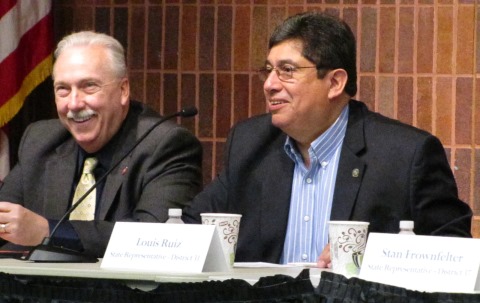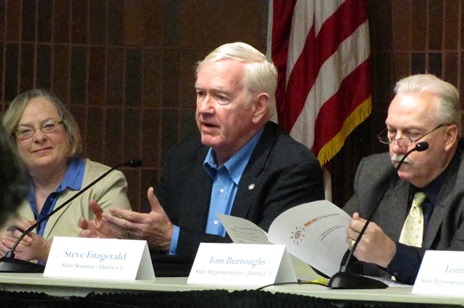
by Mary Rupert
At a recent legislative forum, Wyandotte County legislators questioned a health care compact bill that has passed the Kansas House and Senate and is awaiting the governor’s signature.
The health compact bill would bring all federal funds coming into the state in the health care area, such as Medicare, Medicaid and the Affordable Care Act, under the direction of the state of Kansas.
Rep. Louis Ruiz, R-31st Dist., said a bill backed by Republicans including Rep. Brett Hildabrand of Shawnee, R-17th Dist., Sen. Mary Pilcher-Cook of Shawnee, R-10th Dist., and Secretary of State Kris Kobach was passed by the House and Senate and sent to the governor.
An estimated $7 billion in federal funds coming to Kansas is involved, according to the local legislators. While Kansas would receive the federal funding of health care programs, Kansas would decide how it is spent. The compact is a group of states that would join together to regulate health care. Some of the states that have passed legislation include Missouri, Oklahoma, Alabama, Georgia, South Carolina and Texas.
In order to proceed, this compact would need permission first from the U.S. Congress. One provision of the law, according to the bill summary from the Kansas Legislature, would grant the state “the authority to suspend by legislation the operation of all federal laws, rules, regulations and orders regarding health care that are inconsistent with those adopted by the member state based on the compact.”
“The challenge we see is Kansas right now is not doing a good job with dispensing money to different organizations that need it, i.e., seniors, schools,” Rep. Ruiz said. He made his remarks at the legislative forum April 12 sponsored by the Kansas City, Kan., Area Chamber of Commerce.
“It was more of a symbolic issue against the ACA,” he said. “They didn’t have any plan, where they were going, they just wanted to take control of it. My question was why wasn’t Secretary Praeger involved?”
He said his understanding was the Kansas insurance commissioner was never asked to be part of it.
Praeger sounded a warning on the bill in February, saying that federal money earmarked for Medicare for seniors, for example, could be taken from that program to fund other priorities of the Legislature. At that time, Praeger noted that senior citizens had paid into Medicare through their payroll tax deductions and expect to receive the benefits they paid for.
Rep. Ruiz also asked why Kobach was involved and was told that it was because of constitutional issues.
“We don’t know the ramifications of this law,” Rep. Ruiz said. It could affect seniors’ benefits and other federal funds that come here, he said. He said he didn’t believe it was good for the state. He also noted there were a lot of seniors opposing it.
“We’re all going to be affected by this, if not we will have family members affected,” he said.
The compact has not been formed yet, the bill authorizes Kansas to join it, Sen. Steve Fitzgerald, R-5th Dist., pointed out. At the forum, there was no explanation of reasons for voting for the bill from any supporters. Fitzgerald voted for the bill, while Sen. Pat Pettey and Sen. David Haley voted against it.
According to the House Journal of March 24, one group of representatives including Rep. Don Hineman stated: “I vote yes on HB 2553 because I believe the Affordable Care Act, otherwise known as Obamacare, is a seriously flawed federal policy. It harms hardworking Kansans and does not properly deliver healthcare reform. While HB 2553 would create serious implementation issues if it should ever be endorsed by Congress, I consider that to be an unlikely outcome. My vote in the affirmative is intended to send a message to Congress: Obamacare is an ill-conceived and unworkable program. I implore Congress to work diligently toward effective healthcare reform.”
Sen. Pettey, D-6th Dist., said there were a lot of unknowns in the compact.
“There really is not enough information to say that we would be good managers of our money, the $7 billion,” she said. “Particularly seniors under Medicare should be very, very cautious about this whole idea.”
She said the state could determine where they want to spend the federal dollars, within those pots of money, and they don’t have to keep it the same as it is now. Pettey said the compact takes in all the federal health care money that comes to the state.
Mary Ann Flunder, who was in the audience, said nine groups of seniors are opposing this bill. She pointed out that money from the tobacco settlement, which came from adults and older adults, was then spent by the state on programs for young children.
“It looks like each time the older person is having the hardest trouble,” she said.
At a news conference this week, Kansas AARP Director Maren Turner and Insurance Commissioner Praeger urged Gov. Sam Brownback to veto the health compact bill.
Also urging the governor to veto it were Kansas Advocates for Better Care and the Kansas Medicaid Access Coalition.
“Medicare is a guaranteed and stable program that more than 448,000 Kansans depend on for their health care needs,” Turner said in a news release. “Placing this very popular program under the jurisdiction of the state not only increases the size of state government, but joining a health care compact reduces the amount of health benefits and protections as well as the much needed savings beneficiaries now enjoy.”
“Supporters of the bill may tell you it doesn’t affect Medicare, but that is just not true,” Praeger said in the news release. “It could jeopardize the coverage and benefits that seniors have come to count on. It would be a serious mistake to turn the Medicare program over to state control. Kansans have paid into this program through payroll taxes and expect to receive the benefits they have been promised.”
The health care compact bill, HB 2553, passed 29-11 in the Kansas Senate and 74-48 in the House. To read the bill or the legislature’s bill summary, visit www.kslegislature.org/li/b2013_14/measures/hb2553/

